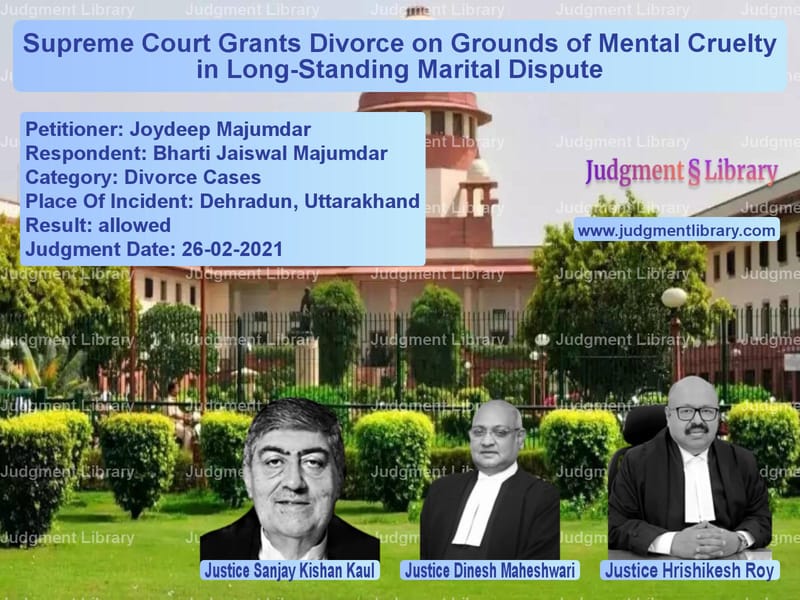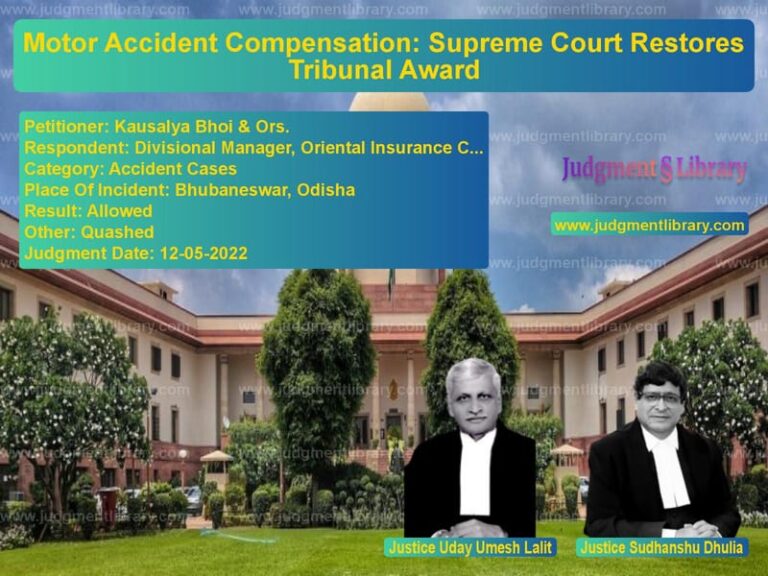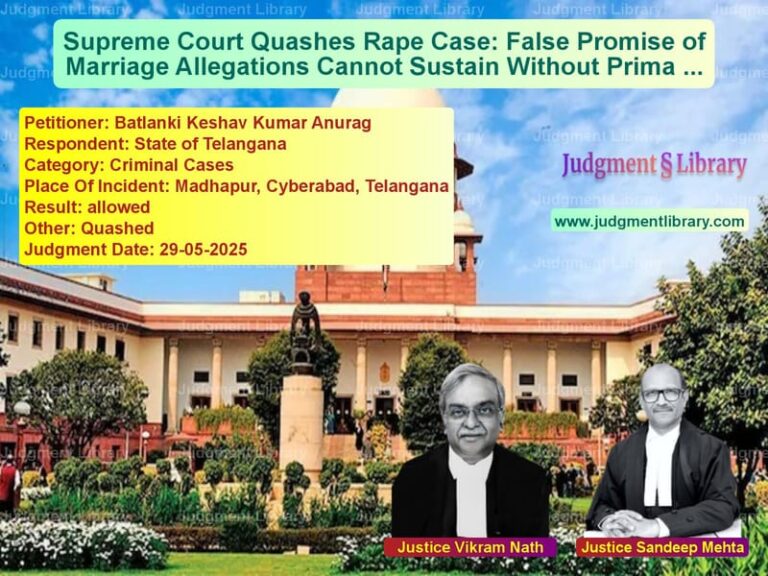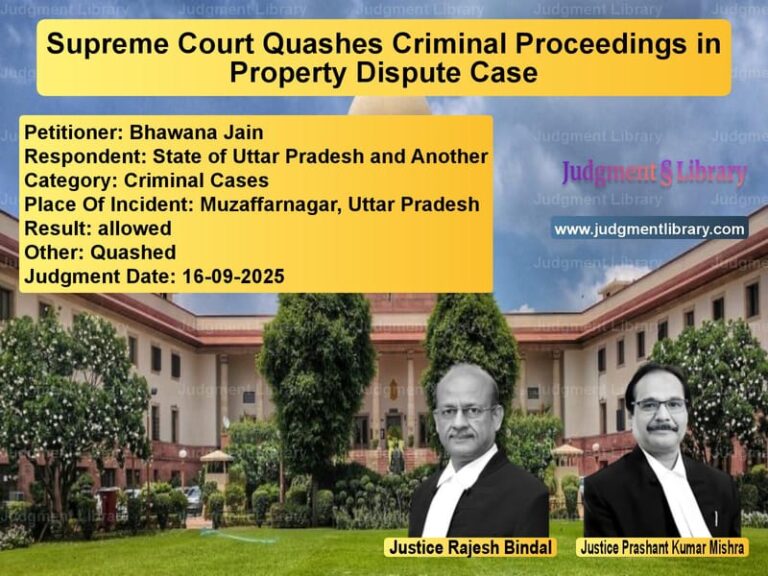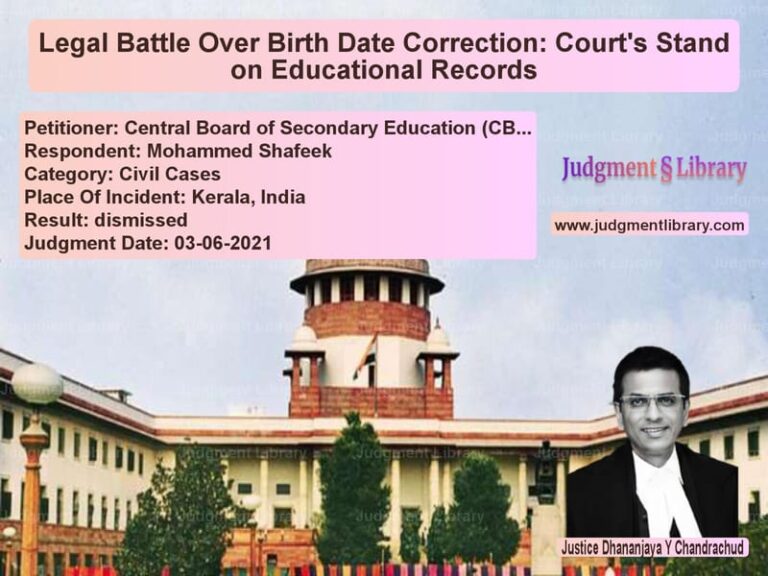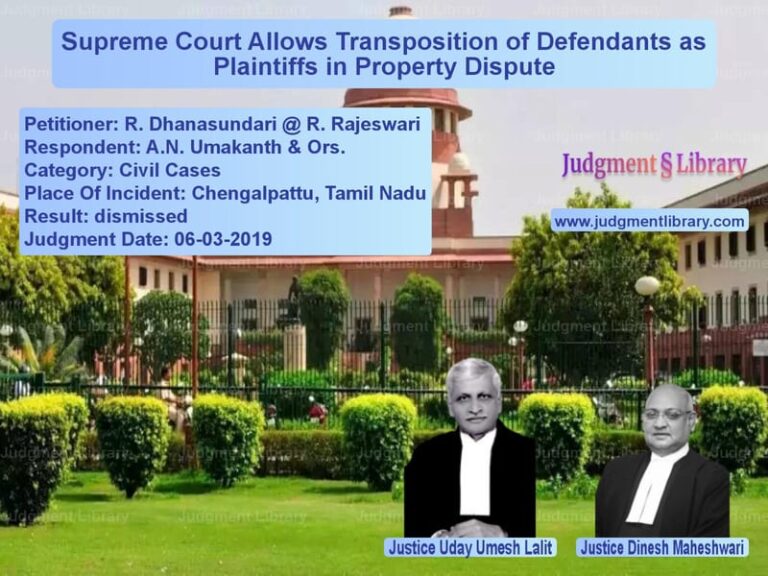Supreme Court Grants Divorce on Grounds of Mental Cruelty in Long-Standing Marital Dispute
The Supreme Court of India recently delivered a landmark judgment in the case of Joydeep Majumdar vs. Bharti Jaiswal Majumdar, granting the husband a divorce on the grounds of mental cruelty. The case revolved around repeated allegations, complaints, and legal battles between the estranged couple that led to irreparable damage to the husband’s career and reputation.
The judgment, delivered by a bench comprising Sanjay Kishan Kaul, Dinesh Maheshwari, and Hrishikesh Roy, overturned the Uttarakhand High Court’s decision and reinstated the Family Court’s order allowing the husband’s plea for divorce.
Background of the Case
Marriage and Estrangement
The appellant, Joydeep Majumdar, an Army Officer with an M.Tech degree, married Bharti Jaiswal Majumdar, a Ph.D. holder and faculty member at a government college in Uttarakhand, on September 27, 2006. However, differences arose soon after, and the couple began living separately from September 15, 2007.
Read also: https://judgmentlibrary.com/transfer-of-matrimonial-cases-supreme-court-upholds-judicial-discretion/
Legal Proceedings
- The appellant initially filed for divorce in Visakhapatnam, while the respondent filed a petition for restitution of conjugal rights in Dehradun.
- The respondent later sought the transfer of the divorce case to Dehradun, which was allowed by the Supreme Court.
- After considering the evidence, the Family Court, Dehradun, granted the husband’s plea for divorce while dismissing the wife’s plea for restitution of conjugal rights.
- The respondent appealed to the Uttarakhand High Court, which reversed the Family Court’s decision, rejecting the claim of mental cruelty.
- The husband then moved the Supreme Court against the High Court’s order.
Supreme Court’s Observations and Judgment
Wife’s Complaints to Authorities
The Court noted that the respondent had filed multiple complaints against the appellant to various authorities, including the Army’s top brass, the State Commission for Women, and other platforms. This led to a court of inquiry against the appellant and negatively impacted his career.
The judgment stated:
“The respondent’s conduct in repeatedly making complaints to the Army authorities and other organizations, without any court ruling those allegations as false, still constitutes mental cruelty.”
Allegations and Their Impact
The appellant argued that the allegations made by the wife severely damaged his reputation and caused immense stress. The Court recognized:
- The wife’s allegations had the potential to irreparably damage the character and dignity of the husband.
- Such repeated complaints amounted to cruelty, making it impossible for the couple to continue their matrimonial relationship.
- The Court rejected the High Court’s reasoning that without a formal court ruling, the allegations could not be deemed false.
Restitution of Conjugal Rights Not Feasible
The respondent argued that she was willing to resume matrimonial life with the appellant. However, the Court rejected this, stating:
“After years of separation and repeated instances of cruelty, compelling the husband to live with the wife would be unreasonable and unjustified.”
Final Judgment
- The Supreme Court overturned the Uttarakhand High Court’s order.
- The Court granted divorce to the appellant on the grounds of mental cruelty.
- The wife’s plea for restitution of conjugal rights was dismissed.
Key Takeaways from the Judgment
- False or unproven allegations made to public authorities can constitute mental cruelty.
- Career and reputation damage is a significant factor in determining cruelty.
- Restitution of conjugal rights is not feasible after prolonged separation and strained relations.
- Judicial intervention is necessary to prevent unnecessary hardship in irretrievably broken marriages.
Impact of the Judgment
This ruling sets a strong precedent in divorce cases based on mental cruelty. It underscores that repeated complaints and false accusations can severely impact a spouse’s career and well-being, justifying the dissolution of marriage.
Conclusion
The Supreme Court’s ruling in Joydeep Majumdar vs. Bharti Jaiswal Majumdar strengthens legal provisions regarding mental cruelty in marriage. By granting divorce and rejecting the plea for conjugal rights, the Court has reinforced the principle that a marriage cannot be sustained under extreme psychological distress and reputational harm.
Petitioner Name: Joydeep Majumdar.Respondent Name: Bharti Jaiswal Majumdar.Judgment By: Justice Sanjay Kishan Kaul, Justice Dinesh Maheshwari, Justice Hrishikesh Roy.Place Of Incident: Dehradun, Uttarakhand.Judgment Date: 26-02-2021.
Don’t miss out on the full details! Download the complete judgment in PDF format below and gain valuable insights instantly!
Download Judgment: joydeep-majumdar-vs-bharti-jaiswal-majum-supreme-court-of-india-judgment-dated-26-02-2021.pdf
Directly Download Judgment: Directly download this Judgment
See all petitions in Alimony and Maintenance
See all petitions in Domestic Violence
See all petitions in Judgment by Sanjay Kishan Kaul
See all petitions in Judgment by Dinesh Maheshwari
See all petitions in Judgment by Hrishikesh Roy
See all petitions in allowed
See all petitions in supreme court of India judgments February 2021
See all petitions in 2021 judgments
See all posts in Divorce Cases Category
See all allowed petitions in Divorce Cases Category
See all Dismissed petitions in Divorce Cases Category
See all partially allowed petitions in Divorce Cases Category

